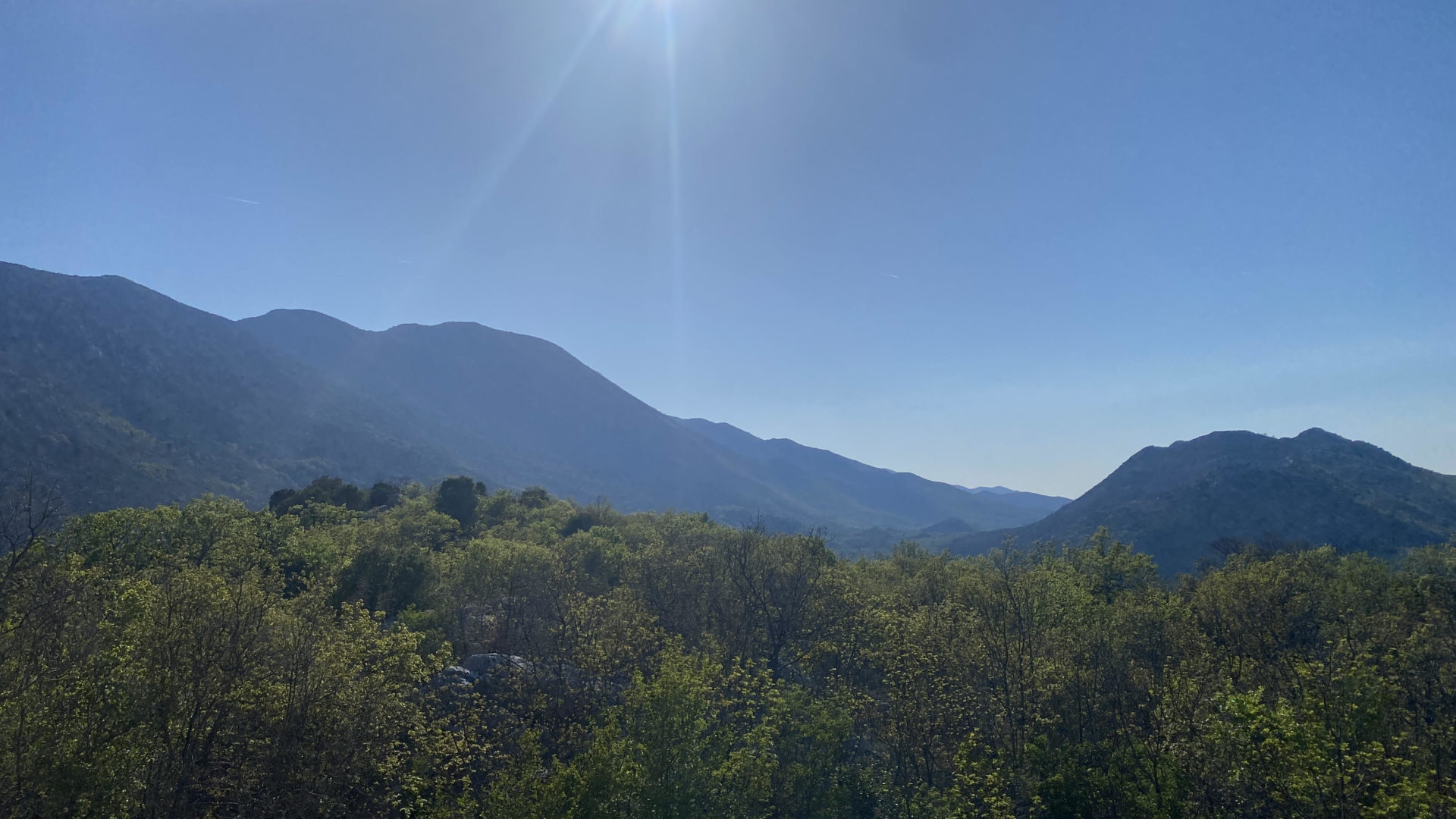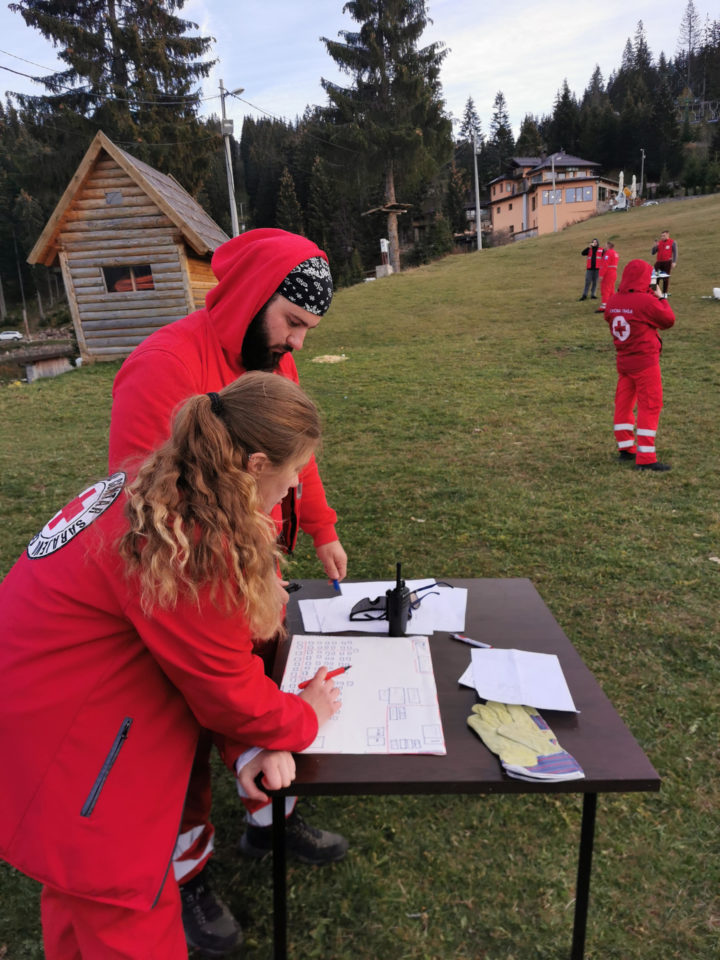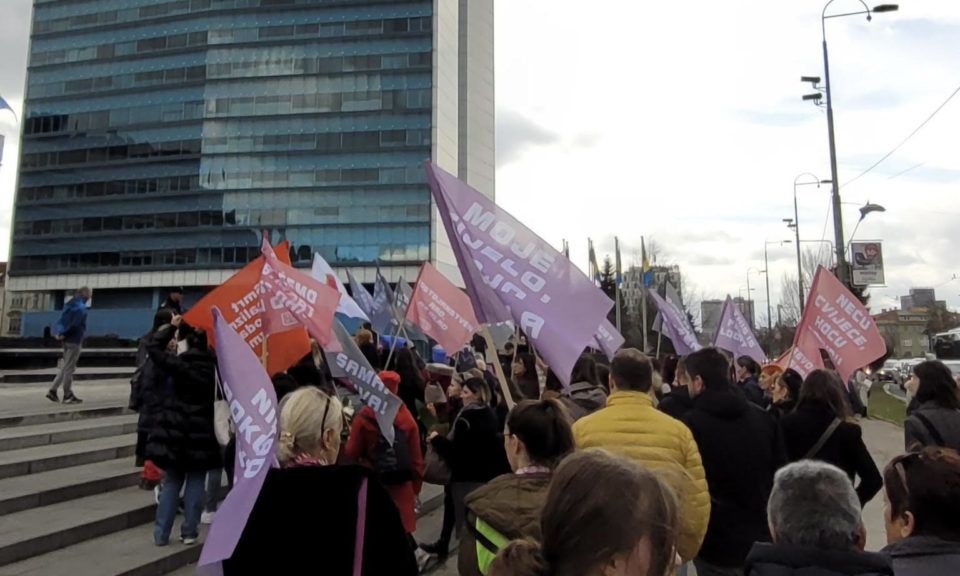
Climate change is becoming increasingly evident in Bosnia and Herzegovina (BiH). Four activists from Sarajevo, Tuzla, and Zenica are tirelessly working to raise awareness about the need to address environmental issues: Samir Lemeš from Eko Forum Zenica, Edna and Meliha from the Youth Movement Revolt Tuzla, and independent activist Layla Jusko.
Lemeš, the president of the Eco Forum Zenica, founded in 2009, explains that global climate activism began in 2019, while in Bosnia and Herzegovina, environmental awareness has a longer history. He considers environmental activism “a calling” that permeates every aspect of his life. In Zenica, advocacy for better air quality dates back to the 1950s, when there was a significant expansion of steel production. At that time, Lemeš explained, the steel industry was generally regarded as a driver of economic growth, and its workers were seen as heroes in society.
The increasing levels of air pollution did not go unnoticed; however, given the lack of sustainable solutions available at the time, people had to deal with the consequences. This led to the introduction of taxes in the 1960s, with coal and steel factories paying the city for pollution.
In later years, technical plans were drawn up to prevent air pollution, but these were not fully implemented before the breakup of Yugoslavia. After the steel plant’s privatisation, promised improvements failed to materialise, prompting citizens to form Eko Forum Zenica.
When asked about the active participants in their organization, Lemeš said that they are mainly older individuals with various professions, including engineers, journalists, and doctors. “It’s still challenging to engage younger people to join us,” he acknowledged, adding that the fight for better air quality requires time, which young people often don’t have.
In 2019, the youth of Bosnia and Herzegovina began participating in the ‘Fridays for Future’ movement. Although these protests continue to happen in many countries, they have ceased in Bosnia and Herzegovina. While seeking out young people involved in the movement, we found Layla Jusko on Instagram. Her experience in environmental activism is similar to that of Lemeš. She emphasized that climate change is a problem that demands greater attention, not only among young people but in Bosnia and Herzegovina generally.
“There is awareness of climate issues here, I can’t say it doesn’t exist, but it’s still not at a satisfactory level, which is concerning. We have only a few people who are actively working on it,” she noted, adding, “Young people are aware of this problem, but there is a lack of willingness for action.”
She explains that the issue seems distant for many because its consequences aren’t readily visible in daily life; we only know it will affect us in the future. Additionally, economic insecurity, distrust in the political system, and a lack of faith in the possibility of change deter people from taking action.
The First Steps Toward Climate Activism
Layla herself became involved in the climate movement after completing an internship at the Red Cross, where she worked on issues related to public health but also learned about the devastating effects of climate change. “It all happened by chance, to be honest. I wasn’t an activist before Covid-19.” She previously volunteered with Let’s Do It, an organisation engaging young people in all parts of Bosnia in clean-up and tree planting initiatives. Layla participated in one of these campaigns and was amazed when she learned how much care is needed for a small tree to survive. She started researching on her own and attended educational seminars. She realized that she could combine her passion for public health with climate activism and began educating people about climate change, both within Let’s do it BiH and the Red Cross. “I just found my calling. I always say, for me it isn’t activism, it’s literally a way of live.”

Meliha from Revolt says that her first encounter with activism was on March 8th, International Women’s Day. After a protest, she contacted Revolt, the group that was organizing the march, met with them, and eventually became a member.
Revolt Tuzla was established in 2005, following student protests, and consists of 20-30 members between the ages of 17 and 25. The group addresses a wide range of local issues and lately has increasingly focused on climate change. Their activities include street initiatives on significant occasions, informing the public on local issues, and organizing workshops. They also hold a summer school on political activism and public discussions with local political candidates.
Asked about their activism, Edna explained that the reactions are mainly positive.
“Some people take an apathetic stance, which is really common in our society, where they tell us that we’re doing this for nothing – ‘You’re not going to change anything.’ But most are really proud that a group of young people is coming together and at least trying to make a change. And I think we are, at least in some areas.”
Referring to the range of activities used to lobby for environmental protection, Lemeš explained: “We used all of the forms of activism that we could think of.” When Eko Forum was founded, they first focused on collecting information about the steel plant, researched laws and healthcare issues, and most importantly, produced visuals to make the information easy and accessible to citizens. They also organized protests to attract the attention of local and international media.
Eko Forum established contacts with other organizations in Bosnia and Europe fighting for similar goals. A Czech grassroots organization shared their experience fighting air pollution and helped them file a criminal charge against ArcelorMittal for endangering public health. . Eko Forum’s experience shows the challenges faced by local groups confronting large corporations. These companies disregard local concerns and the fines imposed for exceeding limit values, as they find it more economical to pay these fines than to install effective filter systems. The lawsuit, however, gave Eko Forum’s demands more weight and demonstrated their seriousness. They also approached international banks funding the plant, which wield considerable power given that the company is dependent on loans.
Recent protests against small hydropower plants have shown that awareness is growing. Protest proved to be an effective tool, resulting in the passing of a law which banned new small hydropower plants in the Federation.

This topic of internationalising the fight against the climate crisis also arose in conversations with the other activists. While acknowledging the importance of local-level activism, they also noted that that many climate-related challenges are similar across capitalist systems.
For this reason, joining forces with others facing these challenges can be an effective way of addressing them. It’s a way to amplify their message and make their voices heard on a global scale. As climate change is a global issue, internationalising the struggle, finding allies, and standing together in solidarity is central to the success of the movement. This is also the idea behind the newly formed Cooperation and Development Network Eastern Europe, which connects youth green movements across Eastern Europe and the Caucasus Region, including Revolt Tuzla.
Linking Different Struggles
Connecting various interrelated struggles is another strategy employed by climate activists, recognizing that the climate crisis intersects with feminist, anti-capitalist, and other social movements. Edna highlighted the importance of bridging social and ecological issues, noting how Revolt has tried to link workers’ rights with the green movement. Recent years have shown that the climate crisis is first and foremost a social crisis. Over the past decade, rising temperatures have caused heat waves, forest fires, droughts, and floods, such as the devastating floods in BiH in May 2014. These events have dire consequences, as people have lost not only their homes but even their lives in floods or wildfires. There have also been heavy high harvest losses and water shortages, affecting people, agriculture, and hydropower plants that generate electricity. As a result, the climate crisis has led to higher prices for food and electricity, thereby worsening social inequalities.
Recently, there has been a growing focus on intersectionality and climate justice, two concepts that identify climate change as a symptom of unjust economic, social and political conditions and recognizes that not every country, community or individual has the same resources to fight the climate crisis. While there are individual actions everyone can take, such as recycling, using public transport or using less plastic, these are not sufficient to tackle the scale of the problem. It is the responsibility of politicians and big corporations to end exploitative practices, making advocacy one of the most effective tools for ordinary citizens to combat climate change and fight for better environmental regulation.
This injustice is not just at the individual level but also at the global level and between richer and poorer countries. Lemeš highlighted the problem of an “unjust green transition”, where wealthier countries can afford more expensive technologies due to their exploitation of other countries’ resources.
“A just transition is a distant goal. At the moment, it’s not just because rich countries like Germany, the US, and Sweden can afford more expensive technologies, because they use their resources and those of that used to belong to other countries. They’re rich now because of their past exploitation of resources. Poorer countries like ours still don’t have that level of development, and now we see this as a burden.”
In Zenica, steps have been taken to link the social and environmental dimensions of the green transition by establishing an IT department at the local university to train young people in software engineering. This initiative aims to retain the city’s younger population and eventually attract outside companies to Zenica, thereby reducing the city’s dependence on polluting industries.
Lemeš pointed out another aspect of a just transition, related to lithium mining, which is needed to build electric cars, among other things. the topic of lithium mining, which is for example needed to build electric cars. “Lithium is one aspect of the green transition. With the mining of lithium in Serbia and Bosnia, we see that we will have the consequences of mining, but we cannot afford to buy electric cars. This is an unjust transition. We will have the lithium mines and the pollution, while rich countries will use the electric cars,” he explains. Lemeš added that he is not overly optimistic that ecological standards would be met, citing high levels of corruption and the ease of ‘buying’ politicians.
The Role of NGOs
Lemeš says that it is more important to have civil society as a corrective mechanism for the government. Layla also emphasized the importance of the NGO sector in Bosnia in tackling the climate crisis, as politicians often fail to follow through on promises of a green transition.
All four activists expressed pessimism regarding the country’s compliance with international climate commitments, such as the 2015 Paris Agreement or the Green Agenda for the Western Balkans, which aims for Bosnia to be carbon neutral by 2050.
“It’s basically just ink on the paper. They say they will enable a green transition, but in reality, they won’t. They just want to stay in power. Everything depends on the NGO sector,” Layla reflected.
Edna added that “governments try to push older narratives to conceal the work they’re not doing. Bosnia is among the countries that signed the Paris Agreement, and part of the agreement is that all coal power plants would be closed, but I don’t have high hopes for that. To conceal that, they focus on national tensions instead.”
Climate activism in Bosnia faces unique challenges stemming from the country’s political and social history, which, as Layla observed, makes being an activist here difficult, Layla reflected. The word ‘activist’ has a different connotation in Bosnia. The protest culture lacks vitality and people feel uncomfortable disagreeing with authorities, as it can lead to problems.
“Whenever you hold a demonstration or a protest, it’s a double-edged sword,” Edna said.
Edna believes that many people in Bosnia, and in the wider Balkan region, share the opinion that just because something bad is happening, you shouldn’t be vocal about it because then you can get targeted, called out in your community, or risk losing your job. “That’s because people don’t engage in the public side of activism. But a lot of young people do, as they don’t have that much to risk.”
Given the difficulties of mobilizing people in the streets, all of the activists agreed that education is the key to raising awareness about the future impacts of climate change. “Entering the sphere of activism, it’s good find an organisation that interests you. For every issue, there are usually like-minded people, it’ just a matter of finding and connecting with them,” Edna suggested.
Layla recommended joining a local organisation, as motivating to be surrounded by people who support you and share your values. “One major thing that I would recommend to everyone is to start with something that can be done easily, that doesn’t need funding. Find something in climate activism that suits your profession. If you’re an engineer, see if you can invent something to help to clean the air. If you’re a medical student, concern yourself with public health, educate people about what air pollution does to them. If you’re a political science student, go out and advocate. Do something in the field you love. Climate can be connected to any sphere, from languages to engineering.”






